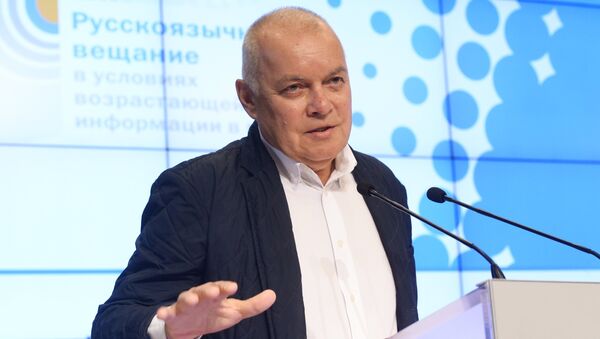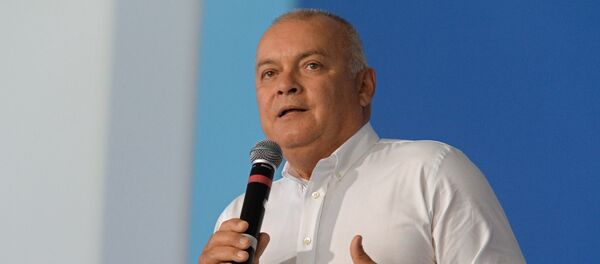The court issued its decision after striking down six pleas in the action that Kiselev brought against the Council of the European Union.
Kiselev, in response to the verdict, decried the European bureaucracy's a priori dominance over the judiciary "since cases against them are progressing in court at a snail's pace."
Russian Ministry of Foreign Affairs issued a statement Tuesday saying that, by upholding its previous verdict, the EU Court allows censorship in the union.
"The EU Court had to show astonishing resourcefulness in order to justify the illegitimate sanctions that are, in fact, punishing a journalist for expressing his own political views," the statement issued by the Foreign Ministry said. "It is very strange that the European Union, which believes it is the protector of the freedom of speech and self-expression in the whole world, allows and, more importantly, approves that sort of censorship within its own borders."
Upon receiving the Court's verdict, Kiselev revealed that he had not been "given the opportunity to personally take part in the hearing" in his own case. Russia's Foreign Ministry slammed the EU Court's refusal to allow Kiselev to take part in hearings on his sanctions challenge, saying that it violates basic rights, including the right to defense.
"In order to achieve their dubious goals, [officials] in the EU not only adapt the stipulations of the EU's basic treaties to match their current political tasks, but also infringe the basic rights, including the right to defense, of individuals and companies that have come under sanctions," the statement said.
The Foreign Ministry pointed out that Kiselev's case indicates that the EU is wary of unbiased assessment of current world affairs, including the situation in Ukraine. This goes against the EU citizens' rights to access to facts and alternative points of view, the statement said.
Russian Foreign Ministry then stated that Moscow expects OSCE and Council of Europe to weigh in on the decision to uphold sanctions against Kiselev.
"It would be interesting to know what the OSCE and the Council of Europe think about such loose treatment of the freedom of the press, given that its protection is one of their domains," the Foreign Ministry concluded.
The European Union imposed a travel ban and an asset freeze on Kiselev on March 21, 2014. He challenged these restrictions at EU’s General Court in Luxembourg in May 2015, Kiselev, who is also the anchor of the Vesti Nedeli (Weekly News) TV show, was one of the first Russians to face individual EU sanctions after Crimea’s reunification with Russia three years ago.
The General Court's decision can be appealed to the Court of Justice.


